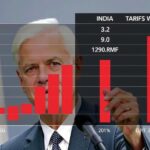India Lowers Tariffs on Bourbon Whisky Following Presidential Criticism
India has reduced tariffs on bourbon whisky from 150% to 100%, benefiting U.S. brands like Jim Beam. This move follows criticism from President Trump regarding India’s trade practices. The tariff change, effective from February 13, applies solely to bourbon, as other liquor tariffs remain unchanged. Experts view this as a strategic shift toward improved trade relations with the U.S.
India has announced a reduction in tariffs on bourbon whisky, lowering the rate from 150% to 100%. This adjustment is expected to benefit American brands, especially Jim Beam, as it becomes more economically viable to import these products. The announcement was made shortly after U.S. President Donald Trump criticized India’s tariffs on American goods, emphasizing the need for fair trade policies.
The new tariff structure, effective as of February 13, includes a basic customs duty of 50% accompanied by an additional 50% duty, resulting in a total import tax of 100% on bourbon whisky. However, other liquor products will continue to be taxed at the previous rate of 150%. This focused reduction indicates a significant shift in India’s approach to U.S. alcohol imports.
Experts, including Pratik Jain from PwC India, suggest that this move reflects India’s willingness to reconsider its tariff strategies with key trading partners, particularly in the spirits sector. It addresses broader concerns regarding high import duties in India’s lucrative $35 billion spirits market, which has been criticized by global businesses as detrimental to growth and trade.
Vinod Giri, director general of the Brewers Association of India, commented that the reduction in bourbon tariffs serves as a strategic gesture to address U.S. concerns and mitigate potential retaliatory measures. He noted, “Tariffs on bourbons, like motorbikes, have high optics value,” indicating the political significance of this decision.
This change in tariff policy aligns with President Trump’s administration’s broader strategy of utilizing tariffs to address trade imbalances and influence foreign policies. The president has previously indicated that tariffs are a valuable tool to generate revenue and encourage cooperation from trading partners, now applying pressure on nations that may engage in what he deems unfair practices.
In conclusion, India’s decision to reduce tariffs on bourbon whisky signifies a strategic response to U.S. criticisms and reflects a potential shift in international trade relations. The new 100% tariff on bourbon may enhance market opportunities for American brands while addressing ongoing concerns regarding high import duties in India’s spirits market. This development illustrates India’s intentions to engage more cooperatively with the United States and other trading partners.
Original Source: www.hindustantimes.com








Post Comment